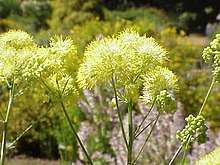Thalictrum
Thalictrum ( /θəˈlɪktrəm/) is a genus of 120-200 species of herbaceous perennial flowering plants in the buttercup family, Ranunculaceae, native mostly to temperate regions.[1] Meadow-rue is a common name for plants in this genus.[2]
| Thalictrum | |
|---|---|
 | |
| Thalictrum flavum | |
| Scientific classification | |
| Kingdom: | Plantae |
| Clade: | Tracheophytes |
| Clade: | Angiosperms |
| Clade: | Eudicots |
| Order: | Ranunculales |
| Family: | Ranunculaceae |
| Subfamily: | Thalictroideae |
| Genus: | Thalictrum Tourn. ex L. |
| Species | |
|
See text | |
Thalictrum is a taxonomically difficult genus with poorly understood species boundaries; it is in need of further taxonomic and field research for clarification.
Despite their common name of "meadow-rue", Thalictrum species are not closely related to the true rue (family Rutaceae), but resemble its members in having compound leaves twice or thrice divided.[3]:120
Description
Meadow-rue leaves are alternate, bipinnately compound, and commonly glaucous blue-green in colour.
The flowers are small and apetalous (no petals), but have numerous long stamens, often brightly white, yellow, pink or pale purple, and are produced in conspicuous dense inflorescences. In some species (e.g. T. chelidonii, T. tuberosum), the sepals are large, brightly coloured and petal-like, but in most they are small and fall when the flower opens or soon after.
Habitat and distribution
Meadow-rues are usually found in shaded or damp locations, with a sub-cosmopolitan range throughout most of the Northern Hemisphere and also south to southern Africa and tropical South America, but absent from Australasia. They are most common in temperate regions of the world; twenty-two species are found in North America.
Ecology
Anemophily (wind pollination) is a characteristic of some members this genus, as seen in Thalictrum fendleri and Thalictrum dioicum. Others, such as Thalictrum sparsiflorum, are entomophilous (pollinated by insects).[4]
Thalictrum species are used as food plants by the larvae of some Lepidoptera species including the Setaceous Hebrew Character moth.
Chemical constituents
Thalictrum species have been extensively studied by chemists. Typical natural products found in this genus are benzylisoquinoline alkaloids such as magnoflorine and the structurally related alkaloid berberine.[5]
Selected species
- Thalictrum alpinum – alpine meadow-rue
- Thalictrum aquilegiifolium – greater meadow-rue
- Thalictrum chelidonii
- Thalictrum cooleyi – Cooley's meadow-rue
- Thalictrum coreanum
- Thalictrum clavatum - Mountain meadow-rue
- Thalictrum dasycarpum
- Thalictrum delavayi – Chinese meadow-rue
- Thalictrum dioicum – early meadow-rue
- Thalictrum fendleri – Fendler's meadow-rue
- Thalictrum filamentosum
- Thalictrum flavum – yellow or common meadow-rue
- Thalictrum glaucum
- Thalictrum heliophilum – cathedral meadow-rue
- Thalictrum kiusianum – Kyushu meadow-rue, dwarf meadow-rue
- Thalictrum minus – lesser meadow-rue
- Thalictrum occidentale – western meadow-rue
- Thalictrum polygamum – tall meadow-rue
- Thalictrum pubescens
- Thalictrum revolutum - waxyleaf meadow-rue
- Thalictrum rochebrunnianum
- Thalictrum sparsiflorum – fewflower meadow-rue
- Thalictrum thalictroides – rue-anemone (syn. Anemonella thalictroides)
- Thalictrum tuberosum
- Thalictrum urbainii
Gallery
 Thalictrum aquilegifolium
Thalictrum aquilegifolium Thalictrum chelidonii
Thalictrum chelidonii Thalictrum coreanum
Thalictrum coreanum.jpg) Thalictrum dasycarpum
Thalictrum dasycarpum Thalictrum delavayi flowers
Thalictrum delavayi flowers.jpg) Early meadow-rue (Thalictrum dioicum)
Early meadow-rue (Thalictrum dioicum) Thalictrum filamentosum
Thalictrum filamentosum Thalictrum flavum leaves
Thalictrum flavum leaves Thalictrum glaucum flowers
Thalictrum glaucum flowers Thalictrum kiusianum
Thalictrum kiusianum Female flowers of Thalictrum occidentale
Female flowers of Thalictrum occidentale Thalictrum rochebrunnianum
Thalictrum rochebrunnianum Rue-anemone (Thalictrum thalictroides)
Rue-anemone (Thalictrum thalictroides)- Thalictrum tuberosum
 Thalictrum urbainii
Thalictrum urbainii
References
- Park, Marilyn M.; Festerling Jr., Dennis (1997). "Thalictrum". In Flora of North America Editorial Committee (ed.). Flora of North America North of Mexico (FNA). 3. New York and Oxford – via eFloras.org, Missouri Botanical Garden, St. Louis, MO & Harvard University Herbaria, Cambridge, MA.
- "Thalictrum". Natural Resources Conservation Service PLANTS Database. USDA. Retrieved 9 December 2015.
- Stace, C. A. (2010). New Flora of the British Isles (Third ed.). Cambridge, U.K.: Cambridge University Press. ISBN 9780521707725.
- Steven, Janet; Waller, Donald (2004). "Reproductive alternatives to insect pollination in four species of Thalictrum (Ranunculaceae)". Plant Species Biology. 19 (2): 73–80. doi:10.1111/j.1442-1984.2004.00103.x. Retrieved 6 December 2018.
- Willaman, J. J.; Liu, H.-L. (1970). "Lloydia (Supplement)". pp. 182–183. Missing or empty
|url=(help)
External links
| Wikispecies has information related to Thalictrum |
| Wikimedia Commons has media related to Thalictrum. |